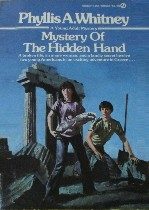 Phyllis A. Whitney •
Phyllis A. Whitney •
Mystery of the Hidden Hand •
Phyllis Whitney favors a tried-and-true story line in her many novels. Take a young female with a problem, a question, or a troubled past, send her to a new environment, and watch her develop in response to the people and things she meets there.
Happily, the formula works just as well in her books for young adults.
Twelve-year-old Gale Tyler is vacationing on the island of Rhodes, far from the talented older sister whose shadow she lives in. Here she meets her Greek cousins for the first time. Tassoula and Nicos are struggling with an autocratic grandfather, long-buried family secrets, and their own ambitions. Gale’s brother, Warren, is concerned only with antiquities, and believes he has made an important archaeological find near a ruined temple on the island.
As in all her books, Whitney adroitly weaves cultural background into a character-driven plot. While exploring the museums, gardens, and historic sites of Rhodes, Gale is disturbed by the presence of Geneva Lambrou, a tourist she considers “malevolent.”
Mrs. Tyler raises her eyebrows at the word. Does Gale really understand what she’s saying?
But her daughter has been busy with the dictionary; malevolent means “wishing evil, disposed to injure, having a baleful influence.” Warren—in the manner of older brothers everywhere—at once demands to know what baleful means.
“ ‘Baleful’ means ‘full of deadly, or pernicious, influence.’ But don’t ask me what ‘pernicious’ means,” says Gale. “I had to stop somewhere.”
Pernicious endings apparently aren’t allowed in children’s books (except for those by Lemony Snicket). Hidden Hand closes with Geneva’s hostility defused, Tassoula and Nicos reaching a rapprochement with Grandfather Thanos, and Gale earning the respect of her family for her own gifts. All is well in the blue Aegean.






Your email address will not be published.